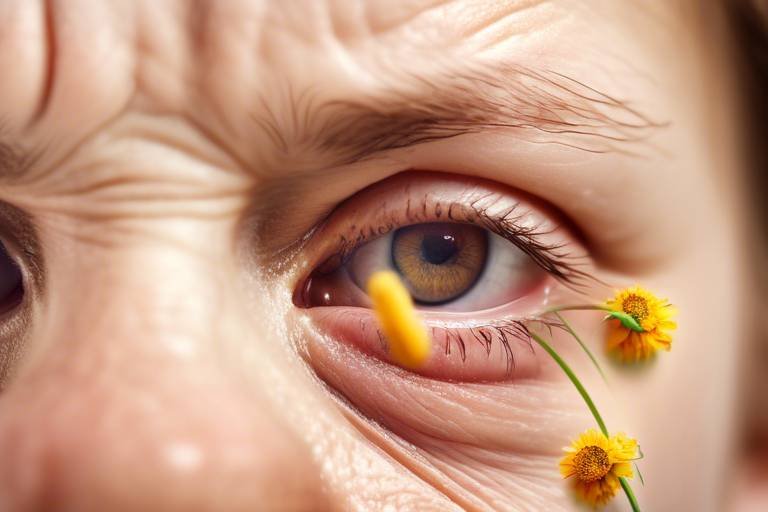How Social Connections Impact Well-Being - The Science
In today's fast-paced world, it's easy to underestimate the profound impact that social connections have on our overall well-being. From the moment we are born, our interactions with others shape our experiences, influence our health, and even determine our happiness levels. Think about it: have you ever felt a rush of joy when you reunite with an old friend or felt comforted by a loved one during tough times? These moments are not just fleeting; they are backed by science. Research shows that our relationships play a crucial role in enhancing both our mental and physical health. So, let's dive into the fascinating world of social connections and uncover the science behind their effects on our well-being.
Understanding why social connections matter is crucial for mental health. Humans are inherently social beings, and our need for connection is as fundamental as our need for food and shelter. When we build relationships, we create a sense of belonging that fosters emotional support and resilience. Imagine being part of a team where everyone has each other's backs; that’s the essence of social connections. They provide a safety net during challenging times, making us feel valued and understood. Moreover, strong relationships can enhance our self-esteem and encourage us to pursue our goals, making life not just bearable but truly fulfilling.
Now, let’s explore the fascinating psychological and physiological mechanisms that explain how social connections influence well-being. Research indicates that social interactions can trigger the release of oxytocin, often referred to as the "love hormone." This hormone is crucial for bonding and can reduce stress levels, making us feel more relaxed and secure. Additionally, positive social interactions can lead to the release of dopamine, the neurotransmitter responsible for feelings of pleasure and reward. When we engage with others, our brains light up, reinforcing the idea that connection is not just important—it's essential.
Social connections can significantly alleviate feelings of loneliness and depression. Research has consistently shown that individuals with strong relationships tend to report higher levels of happiness and lower levels of anxiety. For instance, a study published in the American Journal of Psychiatry found that people who maintain close friendships are less likely to experience depressive symptoms. It's like having a shield against the storms of life; when the winds of sadness blow, those connections can keep us grounded. The emotional resilience gained from these relationships is invaluable, helping us navigate life's ups and downs with greater ease.
Having a reliable support system can enhance our coping strategies during stressful times. Friends and family provide not just emotional support but also practical assistance when we face challenges. Imagine going through a tough breakup or losing a job; having someone to talk to can make all the difference. Research shows that individuals with strong support systems are better equipped to handle stress, as they can share their burdens and receive encouragement. This shared experience fosters a sense of community and belonging that is crucial for mental health.
Being part of a community can significantly boost well-being. When we engage with our neighborhoods or participate in local events, we create bonds that enhance our sense of identity and purpose. Studies have shown that individuals who actively participate in community activities report higher levels of life satisfaction and lower rates of depression. It’s like being part of a large family where everyone looks out for one another. The benefits of community involvement extend beyond personal satisfaction; they also contribute to a healthier society overall.
Social connections are not only vital for mental well-being but also for physical health. Numerous studies indicate that socially connected individuals tend to have lower health risks. For example, a study by the University of California found that individuals with strong social ties had a 50% increased likelihood of survival over a given period compared to those who were more isolated. This connection is often attributed to the positive lifestyle choices that come with strong relationships, such as better nutrition, regular exercise, and lower levels of stress. It's clear that our social circles can influence our health in ways we might not even realize.
In an increasingly digital world, technology plays a significant role in maintaining social connections. While social media platforms can help us stay in touch with friends and family across distances, they also present challenges. On one hand, technology allows for instant communication and the ability to connect with others anytime, anywhere. On the other hand, it can lead to superficial interactions that lack the depth of face-to-face conversations. It's a double-edged sword, and understanding its impact on our relationships is crucial.
Comparing online interactions to in-person relationships reveals distinct differences in emotional fulfillment. While online connections can provide a sense of community, they often lack the emotional depth that comes from face-to-face interactions. For instance, a warm hug or a shared laugh can create bonds that text messages simply cannot replicate. However, it's essential to recognize that both forms of connection have their place in our lives. The key is to find a balance that allows us to enjoy the benefits of both.
As society evolves, so do our social interactions. The future of social connections may involve a blend of technology and traditional face-to-face relationships. With advancements in virtual reality and augmented reality, we might find new ways to engage with others that enhance our emotional experiences. However, it’s vital to remain aware of the importance of genuine connections. As we navigate this digital landscape, let’s not forget the value of looking someone in the eye and sharing a moment that transcends the screen.
- How do social connections affect mental health? Social connections provide emotional support, reduce feelings of loneliness, and enhance resilience against stress, contributing to overall mental well-being.
- What are the physical health benefits of social connections? Strong social ties are linked to lower health risks, including reduced mortality rates and improved lifestyle choices.
- Can technology replace face-to-face interactions? While technology can help maintain connections, it often lacks the emotional depth of in-person interactions, making a balance essential.

The Importance of Social Connections
Understanding why social connections matter is crucial for mental health. Imagine trying to navigate a stormy sea without a lifeboat; that’s what life can feel like without the support of friends and family. Social connections provide us with a safety net, a sense of belonging, and emotional support that can be transformative. Research shows that when we have strong relationships, we are not just happier; we are healthier, too. It's like having a secret weapon against life's challenges.
When we engage with others, our brains release oxytocin, often dubbed the "love hormone," which helps reduce stress and promotes feelings of trust and safety. This biochemical reaction underscores the importance of our social circles. Think of it this way: our relationships are like the roots of a tree, grounding us and providing nourishment. Without those roots, we can easily feel uprooted and lost.
Moreover, social connections contribute to our emotional resilience. Studies indicate that individuals with strong social ties are better equipped to handle stress and recover from adversity. They experience lower levels of anxiety and depression, which are often exacerbated by feelings of isolation. In fact, a lack of social interaction can lead to a decline in mental health, akin to the way a plant wilts without water.
To illustrate this further, let’s consider some key benefits of social connections:
- Sense of Belonging: Being part of a group gives us a feeling of acceptance and community.
- Emotional Support: Friends and family can provide comfort during tough times, acting as a buffer against stress.
- Enhanced Happiness: Engaging with others can lead to increased feelings of joy and fulfillment.
In essence, the importance of social connections cannot be overstated. They enhance our overall well-being, making life not only bearable but also enjoyable. So, the next time you reach out to a friend or family member, remember that you are not just nurturing a relationship; you are also investing in your own health and happiness.

The Science of Relationships
Have you ever wondered why spending time with friends or family makes you feel so much better? The science of relationships offers fascinating insights into how our social connections profoundly impact our mental and physical well-being. At the core of this phenomenon lies a complex interplay of psychological and physiological mechanisms that explain how our interactions with others shape our lives.
When we forge meaningful connections, our brains release a cocktail of hormones and neurotransmitters that elevate our mood and enhance our overall health. For instance, the hormone oxytocin, often dubbed the "love hormone," plays a pivotal role in forming bonds and fostering trust. This hormone surges during moments of intimacy, such as hugging or cuddling, creating a sense of warmth and connection. Additionally, serotonin and dopamine are released during positive social interactions, significantly improving our mood and sense of happiness.
Moreover, research indicates that social connections can lead to a reduction in stress levels. When we interact with loved ones, our bodies respond by lowering cortisol, the primary stress hormone. This means that having a strong support network can literally help us manage stress better, making us more resilient in the face of life's challenges. Studies have shown that individuals with strong social ties experience lower levels of anxiety and depression, highlighting the importance of nurturing our relationships.
But it’s not just about the emotional benefits. The physiological advantages of social connections are equally compelling. A study conducted by researchers at Harvard University found that people with robust social networks have a lower risk of chronic diseases and live longer than those who are isolated. The table below summarizes some key findings from various studies on the health benefits of social connections:
| Study | Findings |
|---|---|
| Harvard Study | Socially connected individuals have a 50% increased likelihood of survival over a given time frame. |
| University of California | Strong social ties can reduce the risk of heart disease by 30%. |
| American Journal of Public Health | Loneliness increases the risk of premature death by 26%. |
This table illustrates just how critical our social networks are to our health. It’s clear that maintaining strong relationships goes beyond just feeling good; it’s a vital component of a healthy life. So, how can we harness the power of these connections? The answer lies in actively cultivating our relationships and seeking out new social opportunities. Engaging in community events, joining clubs, or simply reaching out to friends can create lasting bonds that contribute to our well-being.
In conclusion, the science of relationships reveals that our connections with others are not just beneficial—they're essential for a fulfilling life. By understanding the mechanisms at play, we can take proactive steps to enhance our social lives, leading to improved mental and physical health. So, the next time you’re feeling down, remember that reaching out to a friend might just be the best medicine!
- How do social connections affect mental health? Social connections can reduce feelings of loneliness and depression, leading to improved mood and emotional resilience.
- What role do hormones play in relationships? Hormones like oxytocin, serotonin, and dopamine are released during positive social interactions, enhancing our emotional well-being.
- Can social connections impact physical health? Yes, studies show that strong social ties can lower the risk of chronic diseases and contribute to a longer life.
- How can I improve my social connections? Engage in community activities, reach out to friends, and participate in social clubs to strengthen your relationships.

When we talk about mental health, one of the most significant factors that often comes into play is our social connections. Think about it: how do you feel when you’re surrounded by friends and loved ones? It’s like the world seems a little brighter, right? Studies have shown that strong relationships can lead to a decrease in feelings of loneliness and depression, helping to create a buffer against the stresses of everyday life. These connections can act as a safety net, catching us when we fall and lifting us up when we’re down. In essence, social bonds can be the sunshine in our emotional landscapes.
Research indicates that individuals with robust social networks tend to experience improved mood and emotional resilience. For instance, a study published in the journal *Psychological Science* found that people with strong social ties reported higher levels of happiness and lower levels of stress. This isn’t just anecdotal evidence; it’s backed by science. The presence of friends and family can stimulate the release of oxytocin, often referred to as the “love hormone,” which plays a crucial role in enhancing our feelings of trust and connection. When we feel loved and supported, our brains actually respond by releasing neurotransmitters that can improve our mood.
Moreover, social connections can foster a sense of belonging, which is essential for emotional well-being. When you’re part of a group—be it family, friends, or even colleagues—you’re more likely to feel valued and understood. This sense of belonging can significantly reduce feelings of isolation and anxiety. Imagine being at a concert with thousands of people, all sharing in the same experience; the energy is palpable, and it’s invigorating. That collective experience can provide a profound sense of community and support, reinforcing our mental health.
In addition to the emotional benefits, social connections also encourage healthier behaviors. When we have friends or family who care about us, we are more likely to engage in activities that promote our well-being. For example, a friend might encourage you to join them for a workout or to eat healthier meals. This type of positive reinforcement can lead to a ripple effect, where one healthy choice leads to another, ultimately improving our overall mental health.
In summary, the positive effects of social connections on mental health are both profound and far-reaching. They not only help alleviate feelings of loneliness and depression but also foster a sense of belonging and encourage healthier lifestyles. So, the next time you’re feeling down, reach out to a friend or family member. You might be surprised at how much just a simple conversation can lift your spirits!

Having a reliable support system can be a game changer when it comes to navigating life's ups and downs. Imagine life as a rollercoaster; sometimes you're soaring high, and other times you're plunging into unexpected dips. In these moments, the presence of friends, family, or even colleagues can provide that much-needed safety harness, allowing you to feel secure even when the ride gets bumpy. Research shows that people with strong social networks are better equipped to handle stress and adversity. They tend to bounce back more quickly from setbacks, and this resilience is largely attributed to the emotional and practical support they receive from their loved ones.
One of the most significant benefits of having a solid support system is the emotional validation it provides. When you're feeling overwhelmed, just knowing that someone is there to listen can make all the difference. It's like having a lighthouse guiding you through a stormy sea. Friends and family can offer perspective, helping you to see the situation in a new light and encouraging you to explore coping strategies that you might not have considered on your own.
Moreover, support systems aren't just about emotional backing; they also play a crucial role in practical matters. For instance, during tough times, whether it’s a job loss, health issue, or personal crisis, having someone to help you brainstorm solutions or even just share responsibilities can alleviate a lot of burdens. Here’s how different types of support can come into play:
- Emotional Support: This includes listening, empathizing, and providing encouragement. It’s about being there for someone when they need to vent or feel understood.
- Instrumental Support: This involves providing tangible assistance, like helping with errands, childcare, or even financial support during tough times.
- Informational Support: Sometimes, what we need most is advice or information. A good support system can help you access resources or share knowledge that can guide you through difficult decisions.
In essence, having a strong support system can significantly enhance your coping strategies. Studies indicate that individuals who engage in open communication with their support networks report lower levels of anxiety and depression. They are also more likely to engage in healthy behaviors, such as exercising or seeking medical help when needed. It’s as if these connections act as a buffer against the stresses of life, reducing the impact of negative experiences and promoting a more positive outlook.
But let’s not forget the importance of reciprocity in these relationships. Support systems thrive on mutual aid; when you offer support to others, it strengthens your bonds and creates a cycle of care that benefits everyone involved. So, if you find yourself in a position to lend a hand, remember that you're not just helping someone else—you’re also reinforcing your own support network.
Ultimately, the presence of a supportive network can lead to improved mental health, greater life satisfaction, and even enhanced physical health. It's a beautiful reminder that we are not alone in our struggles and that together, we can weather any storm.
1. How can I build a strong support system?
To build a strong support system, start by nurturing existing relationships. Reach out to friends and family, engage in community activities, and be open to making new connections. The key is to be proactive and show genuine interest in others.
2. What if I feel like I don't have anyone to turn to?
If you're feeling isolated, consider joining clubs or groups that align with your interests. Volunteering can also be a great way to meet people and build connections. Don't hesitate to seek professional help if you need someone to talk to.
3. How can I support someone who is going through a tough time?
Listen actively and without judgment, offer practical help if you can, and encourage them to express their feelings. Sometimes, just being present is the most supportive thing you can do.

When we talk about community engagement, we’re diving into a treasure trove of benefits that extend far beyond just knowing your neighbors. Imagine a vibrant tapestry woven with threads of shared experiences, support, and mutual growth. Engaging with your community can significantly enhance your mental health and overall well-being. It’s like adding a splash of color to what might otherwise be a monochrome existence. When you participate in community activities, whether it's volunteering, attending local events, or simply spending time in communal spaces, you’re not just filling your calendar; you’re enriching your life.
Research has shown that individuals who actively engage with their communities report higher levels of happiness and satisfaction. This is not just anecdotal; studies indicate that the more involved you are in your community, the less likely you are to experience feelings of loneliness and isolation. It’s as if being part of a community acts as a buffer against the stresses of life. You gain a sense of belonging that can transform your outlook on both life and your own personal challenges.
Moreover, community engagement fosters social capital, which refers to the networks of relationships among people who live and work in a particular society. This social capital can lead to enhanced emotional support, better access to resources, and even improved physical health. Think of it like having a safety net made of strong, interconnected relationships that catch you when life throws you a curveball. Engaging with others provides not just emotional sustenance but also practical help, such as sharing childcare responsibilities or pooling resources for community projects.
Here are some specific ways community engagement can boost well-being:
- Increased Sense of Belonging: Being part of a community helps individuals feel valued and connected. This sense of belonging can lead to improved self-esteem and happiness.
- Opportunities for Learning: Engaging with diverse groups exposes individuals to new perspectives and ideas, promoting personal growth and development.
- Access to Support Systems: Communities often provide informal networks that can offer emotional and practical support during tough times.
- Enhanced Civic Responsibility: Engaging with your community can foster a sense of responsibility and pride, encouraging individuals to contribute positively to society.
In essence, community engagement is not just about being physically present; it’s about being emotionally invested. It’s about forming connections that can uplift you during difficult times and celebrate with you during moments of joy. The next time you consider whether to attend a local event or volunteer your time, remember that you’re not just helping others; you’re also helping yourself. The act of engaging with your community is a powerful antidote to the feelings of isolation that many people experience in today’s fast-paced world.
So, what are you waiting for? Step out, get involved, and watch how your world transforms. After all, a well-connected community is a thriving community, and your participation is the key to unlocking its potential.
Q: How can I get involved in my community?
A: Start by researching local events, volunteering opportunities, or community groups that align with your interests. Websites like Meetup or local government pages often list upcoming activities.
Q: What if I feel shy or anxious about joining community activities?
A: It's completely normal to feel apprehensive. Start small by attending low-pressure events or joining online groups. Gradually, you’ll build confidence and find your place in the community.
Q: Are there specific benefits for mental health from community engagement?
A: Yes! Engaging with others can reduce feelings of loneliness, improve mood, and enhance overall life satisfaction. The social support gained from community involvement is invaluable.
Q: Can community engagement help with physical health?
A: Absolutely! Studies have shown that those who engage socially tend to have lower stress levels and better health outcomes, which contributes to a longer, healthier life.

When we think about social connections, it’s easy to focus primarily on emotional and mental well-being. However, the truth is that our relationships have a profound impact on our physical health as well. Numerous studies have shown that individuals with strong social ties tend to live longer, healthier lives. It's almost as if our social networks act as a buffer against the various stressors that life throws our way, providing not just emotional support but also tangible health benefits.
For instance, research has indicated that those who maintain close relationships with family and friends experience significantly lower rates of chronic illnesses, such as heart disease and diabetes. A study conducted by the American Psychological Association found that social isolation can lead to increased inflammation in the body, which is a precursor to numerous health issues. This is where the magic of social connections comes into play; they can help mitigate these risks by fostering a sense of belonging and community.
Moreover, engaging in social activities often encourages individuals to adopt healthier lifestyles. Think about it: when you participate in group activities like hiking, yoga classes, or even just going out for a walk with friends, you're not only enjoying the company of others but also making choices that benefit your physical health. Social interactions often lead to increased motivation to stay active and eat well, which can create a positive feedback loop for overall well-being.
Here’s a quick look at some of the physical health benefits linked to strong social connections:
- Lower Blood Pressure: Social support can help reduce stress, which in turn lowers blood pressure.
- Improved Immune Function: People with strong social ties tend to have better immune responses, making them less susceptible to illness.
- Reduced Risk of Chronic Diseases: Studies show that socially connected individuals have a lower risk of developing chronic diseases.
- Enhanced Recovery: Those with strong social networks often recover faster from surgeries and illnesses.
Interestingly, the impact of social connections on physical health can be compared to that of regular exercise or a balanced diet. Just as we prioritize physical activity and nutrition for our health, nurturing our relationships is equally important. In fact, some researchers suggest that the quality of our social interactions can be as vital to our health as traditional lifestyle factors. So, investing time in friendships and community can be one of the most significant health decisions we make.
In conclusion, the benefits of social connections extend far beyond mere emotional support. They play a crucial role in our physical health, influencing everything from our immune systems to our risk of chronic diseases. So, the next time you’re tempted to skip that coffee date with a friend or put off joining a local club, remember that these connections are not just good for your heart—they're good for your body, too.
- How do social connections affect mental health?
Social connections provide emotional support and a sense of belonging, which can significantly reduce feelings of loneliness and depression. - Can technology replace face-to-face interactions?
While technology can help maintain connections, it often lacks the emotional depth of in-person interactions, which are crucial for overall well-being. - What are some ways to strengthen social connections?
Engaging in community activities, reaching out to friends regularly, and being open to new relationships can help strengthen social ties. - Is it possible to have too many social connections?
Quality often trumps quantity; having a few meaningful relationships can be more beneficial than having many superficial ones.

In today's fast-paced world, technology has become an integral part of our lives, reshaping how we connect with one another. From social media platforms to instant messaging apps, the digital landscape offers a plethora of ways to maintain relationships, regardless of geographical barriers. But have you ever wondered how these technological tools affect our social connections? Are they enhancing our lives or creating a facade of connectivity? Let's dive into the complexities of technology's role in our social interactions.
On one hand, technology provides incredible opportunities for us to stay in touch with friends and family, no matter where they are. With just a few taps on a screen, we can share our thoughts, photos, and experiences with loved ones, fostering a sense of closeness. Imagine being able to share a laugh with a friend halfway across the globe through a video call or celebrating milestones together through social media posts. These moments, facilitated by technology, can significantly enhance our feelings of belonging and connection.
However, as we embrace the convenience of digital communication, we must also acknowledge the potential downsides. While online interactions can be fulfilling, they often lack the depth and emotional richness of face-to-face encounters. Studies suggest that in-person relationships tend to be more satisfying and supportive, as they allow for non-verbal cues, such as body language and tone, which are crucial for effective communication. So, while scrolling through your feed might give you a quick dopamine hit, it may not replace the warmth of a hug or the joy of sharing a meal with a friend.
Moreover, the rise of social media has introduced a phenomenon known as "social comparison," where individuals may measure their self-worth against the curated lives of others. This constant exposure to seemingly perfect lives can lead to feelings of inadequacy and isolation. According to research, excessive use of social media platforms can contribute to anxiety and depression, highlighting the need for a balanced approach to technology usage. It’s essential to remember that what we see online is often a highlight reel, not the full story.
In response to these challenges, many people are beginning to seek a more mindful approach to their digital interactions. This includes setting boundaries for technology use, such as designated "phone-free" times during family dinners or social gatherings. Additionally, some are opting for platforms that prioritize meaningful connections over superficial interactions, steering clear of the endless scroll of likes and shares.
As we look to the future, the role of technology in social connections will likely continue to evolve. With advancements in virtual reality and augmented reality, we may soon experience social interactions in entirely new ways. Imagine attending a virtual concert with friends or exploring a new city together through a digital landscape. These innovations could provide exciting opportunities for enhancing our social lives, but they also raise questions about the authenticity and depth of these experiences.
In conclusion, technology undoubtedly plays a significant role in shaping our social connections. While it offers numerous benefits, including convenience and accessibility, we must remain vigilant about its potential drawbacks. By striking a balance between online and offline interactions, we can harness the power of technology to enrich our relationships while safeguarding our mental well-being.
- How does technology impact mental health?
Technology can have both positive and negative effects on mental health. While it provides a means to connect with others and find support, excessive use can lead to feelings of isolation and anxiety. - Are online relationships as fulfilling as in-person ones?
Generally, in-person relationships tend to offer more emotional depth and satisfaction. However, online relationships can still be meaningful, especially when they are built on trust and mutual understanding. - What are some ways to maintain a healthy balance with technology?
Setting boundaries for technology use, engaging in face-to-face interactions, and being mindful of social media consumption are effective strategies to maintain a healthy balance.

In today's fast-paced world, the way we connect with others has transformed significantly. With the rise of technology, particularly social media, many of us find ourselves navigating a complex landscape of online relationships and traditional face-to-face interactions. But how do these two modes of connection stack up against each other? Are we sacrificing the depth of our relationships for the convenience of a screen? Let's dive into the nuances of both types of connections.
First off, it's essential to acknowledge that online relationships offer a unique set of advantages. They allow us to connect with people from all corners of the globe, breaking down geographical barriers that once limited our social circles. Imagine being able to share your thoughts and experiences with someone halfway across the world in an instant! This accessibility can lead to a broader understanding of different cultures and perspectives, enriching our lives in ways that face-to-face interactions might not.
However, as convenient as online connections can be, they often lack the emotional depth found in face-to-face relationships. When we communicate in person, we benefit from non-verbal cues such as body language, facial expressions, and tone of voice—elements that are crucial for building trust and understanding. In contrast, online interactions can sometimes feel superficial and detached, as they often rely solely on text or images. This can lead to misunderstandings or a lack of genuine emotional connection.
Research has shown that while online relationships can provide a sense of community, they may not fulfill our emotional needs to the same extent as in-person interactions. For instance, a study by the American Psychological Association found that individuals who primarily communicate online report higher levels of loneliness compared to those who maintain strong face-to-face relationships. This suggests that while online connections can supplement our social lives, they may not be a complete replacement for the richness of in-person interactions.
To put it simply, think of online relationships as a virtual appetizer—they can whet your appetite for connection but often leave you craving the main course of face-to-face interaction. This isn't to say that one is inherently better than the other; rather, they serve different purposes and can coexist in our lives. For example, you might enjoy a lively discussion with friends online while still cherishing those weekend coffee dates that nourish your soul.
Another critical aspect to consider is how technology impacts the quality of our relationships. While social media platforms can facilitate connections, they can also create a false sense of intimacy. It's easy to curate an online persona that may not reflect our true selves, leading to relationships that are based more on perception than reality. In contrast, face-to-face interactions allow for more authentic exchanges, where we can be vulnerable and open, fostering deeper connections.
In conclusion, both online and face-to-face relationships have their place in our lives. The key is to strike a balance that works for you. Embrace the convenience of online connections while also prioritizing in-person interactions that can provide the emotional depth and support we all crave. After all, as social beings, we thrive on connections—whether they're made through a screen or across a table.
- Can online relationships be as meaningful as face-to-face ones? While they can provide valuable connections, they often lack the emotional depth of in-person interactions.
- How can I maintain a balance between online and offline relationships? Prioritize face-to-face meetings when possible, and use online platforms to supplement your social life.
- What are the signs of a healthy online relationship? Look for open communication, mutual respect, and a sense of connection, even if it's virtual.

As we look ahead, the landscape of social connections is undergoing a remarkable transformation, driven largely by advancements in technology and shifts in societal norms. The future promises a blend of traditional interactions and innovative digital platforms, creating a unique tapestry of relationships that could redefine how we connect with one another. Imagine a world where geographical boundaries vanish, allowing friendships to blossom across continents, yet simultaneously, we may find ourselves grappling with a paradox: while we can connect with anyone, are we truly connecting?
One of the most significant trends shaping the future of social connections is the rise of virtual reality (VR) and augmented reality (AR). These technologies have the potential to create immersive experiences that mimic real-life interactions. Picture attending a concert with friends from around the globe, all while wearing VR headsets that make you feel as if you're in the same room. This could revolutionize how we experience events and share moments, making long-distance relationships more fulfilling. However, we must ask ourselves: will these virtual encounters ever replace the warmth of a hug or the joy of sharing a meal together?
Moreover, the role of social media is evolving. Platforms are increasingly focusing on fostering genuine connections rather than simply accumulating likes and followers. This shift could lead to more meaningful interactions, where users prioritize quality over quantity. For instance, algorithms may start promoting posts that encourage discussions and interactions among friends rather than just broadcasting personal achievements. As we navigate this new terrain, we must remain vigilant about the balance between online and offline interactions, ensuring that digital connections enhance rather than replace our face-to-face relationships.
Another intriguing aspect of the future is the growing emphasis on mental health and well-being. As society becomes more aware of the importance of emotional support, we may see a surge in community-based initiatives aimed at strengthening social ties. Neighborhood gatherings, local clubs, and support groups could become the norm, fostering a sense of belonging that many crave in our fast-paced world. The idea of community engagement will likely evolve, with technology acting as a facilitator rather than a substitute. Just as a garden needs nurturing to flourish, our social connections will require care and attention to thrive in the coming years.
In summary, while the future of social connections holds exciting possibilities, it also presents challenges that we must navigate thoughtfully. The interplay between technology and human interaction will likely shape our relationships in profound ways. As we embrace these changes, let’s not forget the fundamental human need for connection. After all, no matter how advanced our tools become, the essence of our relationships will always lie in the shared experiences, emotions, and support that we offer each other.
- How will technology impact future social connections? Technology will likely enhance our ability to connect with others, but it must be balanced with real-life interactions to maintain emotional fulfillment.
- Will virtual reality replace face-to-face interactions? While VR can create immersive experiences, it is unlikely to fully replace the warmth and intimacy of in-person connections.
- What role will community engagement play in the future? Community engagement will become increasingly important as people seek meaningful connections and support networks in their local areas.
Frequently Asked Questions
- Why are social connections important for mental health?
Social connections are crucial for mental health because they provide a sense of belonging and emotional support. When we engage with others, we can share our experiences and feelings, which helps to alleviate feelings of loneliness and depression. Strong relationships can bolster our mood and enhance our emotional resilience, making us better equipped to handle life's challenges.
- How do relationships influence our physical health?
Research shows that social connections can significantly impact physical health. Individuals with strong social ties often experience lower health risks, including reduced chances of chronic diseases. This is partly due to the stress-relieving effects of social support, which can lower blood pressure and improve immune function. In essence, being socially connected can lead to a healthier, longer life.
- What role does technology play in maintaining social connections?
In today's digital age, technology is a double-edged sword. On one hand, it allows us to stay connected with friends and family across great distances, fostering relationships that might otherwise fade. On the other hand, excessive reliance on social media can lead to superficial interactions, which may not provide the same emotional fulfillment as face-to-face connections. Balancing online and offline interactions is key to maintaining healthy relationships.
- Can online relationships be as fulfilling as in-person ones?
While online relationships can offer convenience and broaden our social circles, they often lack the depth and emotional connection found in face-to-face interactions. Many people find that in-person relationships provide a greater sense of intimacy and understanding. However, online connections can still be meaningful, especially when they complement our offline relationships.
- What are some ways to strengthen social connections?
Strengthening social connections can be as simple as reaching out to friends or family more often. Consider engaging in community activities, joining clubs or groups that align with your interests, or volunteering. These actions not only enhance your social network but also contribute to a sense of purpose and belonging, which are vital for overall well-being.
- How can I cope with feelings of loneliness?
Coping with loneliness involves taking proactive steps to connect with others. This could mean scheduling regular catch-ups with friends, participating in community events, or even seeking professional support if needed. Remember, it's okay to reach out for help; building connections takes time, but the rewards are well worth the effort.
- What future trends might affect social connections?
As society evolves, we may see shifts in how we form and maintain relationships. Advances in technology could lead to new forms of interaction, while changing cultural norms may influence our social behaviors. It's likely that the importance of community and face-to-face interactions will continue to be emphasized, reminding us that despite technological advancements, genuine connections remain essential for our well-being.


















